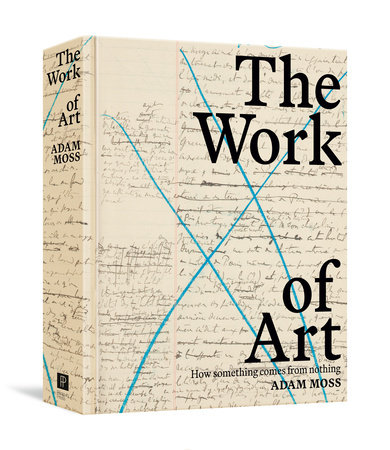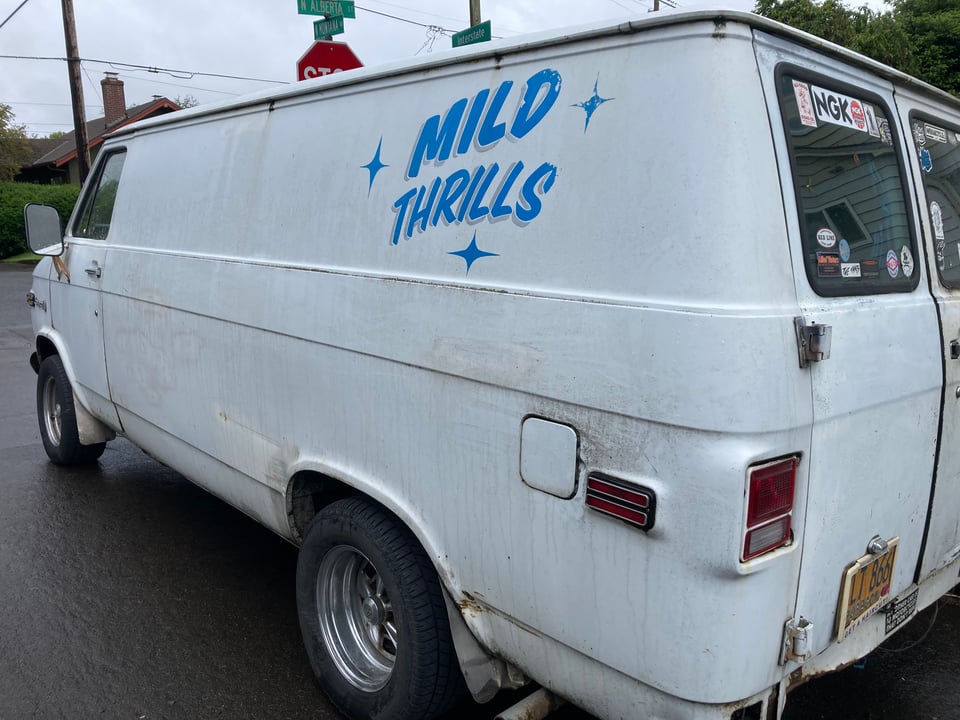Summer 2024 Newsletter
Greeting from Portland summer.
With my Wisconsin driver’s license set to expire soon, I went to the DMV to get an Oregon license. The clerk and I went through the usual paperwork, I gave her my Wisconsin license and proof of residence here. When she finished she handed me a receipt, smiled, and said “Welcome home.” A little gesture can go a long way.
On a sort of related note, there was no discount or accolade provided for cycling to the DMV. But they do have bike racks, and I got to play the drums at the hollowed out Guitar Center store across the road. The staff is pretty bored, and the drum room has doors you can shut fully, so I banged away for an hour without anyone really noticing.
The Work of Art: Behind the scenes with great artists

Veteran editor Adam Moss interviews a giant range of artists — playwright Stephen Sondheim, chef Samin Nosrat, filmmaker Sofia Coppola, and dozens more. The book traces the evolution of select novels, paintings, jokes, movies, songs, performance art…and it’s full of notes, drafts, sketches, and waystations en route to the final work.

In an interview with David Mandel, showrunner for the comedy series Veep, I learned about “alts,” where a scripted scene is shot as written, and then various improvisations are tried, sometimes dozens. Mandel says:
As we start shooting, I just start yelling the alts [to the actors] as I read or as I’m coming up with them myself, or someone whispers something in my ear...[the actors] do one take after another...
Later, while editing the episode, Mandel will watch each version of the joke and choose the one that makes him laugh the hardest. I love the idea that folks are trying lots of possibilities as they film.
Advanced Equine Studies
Bumper sticker watch

Thousands Believe Covid Vaccines Harmed Them. Is Anyone Listening?
All vaccines have at least occasional side effects. But people who say they were injured by Covid vaccines believe their cases have been ignored.
This is an important and nuanced discussion I believe we’ve overlooked. And I must admit to being unaware of most of the concerns cited in the article. To be clear — they’re not coming from ill-informed anti-vaxxers, but simply individuals who clearly assert they have been harmed by the Covid vax. Paul and I often talk about narratives and political ideology, his response was:
« Perhaps the top takeaway I have from this is something I believe you and I have started to believe more and more recently, and that is this: owning the bad parts of a thing is the way to go.
I understand there is the fear of “if we mention there are any issues with this, the far right will take it and run with it, so we have to downplay!” but I just don’t think that has any real benefit beyond super short term. A position that fully owns the weaknesses of its own position is a much more trustworthy position than a position that seems to downplay or cover up its own weaknesses.
I believe if the media (as well as perhaps the pro-vaccine tribe in general) could have been much more about “we know there are potential side effects, but the side effects of Covid are so much worse and it will be almost impossible not to get Covid unless you never leave the house!” and less “the far right are dumb because they are anti-vaxxers, vaccine = good, Trumpers = dumb”… we would be in a much better place with this stuff. »
I fully agree — the narrative matters. We should also put in perspective our many actions that come with clear, measurable risks (driving, for one) that we take because they also convey a benefit.
NY Times gift link:
https://www.nytimes.com/2024/05/03/health/covid-vaccines-side-effects.html?unlocked_article_code=1.xU0.tsdd.Q3y9Fk-GnQVn&smid=em-share** Note: I don’t just read the NY Times, and I certainly don’t agree with all they publish. But they do a lot of good journalism, and I’m highlighting a some of it here.
All hail the ‘90s
I try not to romanticize eras, though I probably fail often, but there is weight to this argument. DeBoer has also become one of my favorite writers—a genuine, un-woke progressive who has done real advocacy work, and a key figure on the GSD^ movement.
^ Getting (Actual) Shit Done

It's So Sad When Old People Romanticize Their Heydays, Also the 90s Were Objectively the Best Time to Be Alive
The 90s were better. They just were. I’m sorry, but it’s science. It was the past, but there were vaccines and Jim Crow was over and there was a modern sensibility without all of the pathologies of the internet. Bill Clinton sucked and our government was doing all kinds of awful skulduggery in the world, but he didn’t suck in the same way as George W. Bush and there wasn’t this constant sense of the world falling apart. There was optimism about the coming of the new millennium before we found ou...
Continuing cleverness

What qualifies as ‘mild thrills’? I’d suggest that driving around with the windows down, listening to All Things Considered, drinking CBD water, would do.
Professor Keith Humphreys on Drug Policy
Drug policy feels very unsettled right now. The war on drugs was a failure. But so far, the war on the war on drugs hasn’t entirely been a success, either.
Take Oregon. In 2020, it became the first state in the nation to decriminalize hard drugs. It was a paradigm shift — treating drug-users as patients rather than criminals — and advocates hoped it would be a model for the nation. But then there was a surge in overdoses and public backlash over open-air drug use. And last month, Oregon’s governor signed a law restoring criminal penalties for drug possession, ending that short-lived experiment.
Other states and cities have also tipped toward backlash. And there are a lot of concerns about how cannabis legalization and commercialization is working out around the country. So what did the supporters of these measures fail to foresee? And where do we go from here?
A stellar interview with Keith Humphreys on drug policy. Professor Humphreys he doesn’t just sit in his ivory tower writing books, but actively volunteers in San Francisco’s Tenderloin district, currently a hotbed of open air drug dealing and use. This interview kept me rapt and engaged for the duration, and has so many smart, nuanced observations on the complexities of drug policy.
To give one example: many states have legalized cannabis, but its regulation has been awful. Humphreys suggests that just like the alcohol industry (or KFC), the big money is made on chronic users, not occasional ones. When an industry’s profitability is directly tied to abuse of their product, you have a massive conflict of interest — a huge problem.
I’m impressed by the deep discussions and brilliant guests Ezra Klein has had on his podcast lately. Sam Harris’, too.

The Ezra Klein Show Podcast - This Is a Very Weird Moment in the History of Drug Laws | Free Listening on Podbean App
Drug policy feels very unsettled right now. The war on drugs was a failure. But so far, the war on the war on drugs hasn’t entirely been a success, either.Take Oregon. In 2020, it became the first state in the nation to decriminalize hard drugs. It was a paradigm shift — treating drug-users as patients rather than criminals — and advocates hoped it would be a model for the nation. But then there was a surge in overdoses and public backlash over open-air drug use. And last month, Oregon’s governo...
Well done: What Facebook Is Like Now
I need say no more.
How should we honor the dead of our mismanaged wars?
This is a question I’ve pondered for a long time. We know that in the U.S., the choice and burden of military service does not fall equally across the socioeconomic spectrum. As a practical matter, why would you want to risk your life for a nebulous idea of freedom or patriotism? It is not, nor has it ever been since, 1941.

A common narrative is that people enlist because they want to defend their country (after 9/11, for example). But how do we know their true motivations? I suppose we can ask, but only they know. That’s like asking a doctor if they chose their career to help people, or to make a ton of money. What if it’s both? Or what if they started with one motivation, but then it shifted?
NYTimes gift link:
https://www.nytimes.com/2024/05/26/opinion/memorial-day-faiiled-wars.html?unlocked_article_code=1.vE0.apeR.UGgc9Dndo_xW&smid=url-shareLocal tunes
Let’s close on a high(er) note: have you heard the new Foamboy album? Why not? Why wouldn’t you pour a little jazz sauce on your disco funk?
https://foamboy.bandcamp.com/album/eating-me-alive-deluxe-edition
Closing quotes and reflections
If you watch Rocky backwards it's an unboxing video
- dan mentos @danmentos.com

I [also] think we’ve jumped the shark as a species when I have this thumbnail on my Youtube suggestions.
- Paul E.
Finally…Resse’s have gotten very aggressive with their ‘formula’. Can they make a shampoo?
